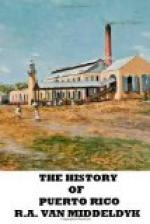Thus fared the crown of Spain, the erstwhile proud mistress of half the world, and the degenerate successors of Charles V accept an asylum in France from the hands of a soldier of fortune.
But if their rulers had lost all sense of dignity, all feeling of national pride, the Spanish nation remained true to itself, and when the doings at Bayona became known a cry of indignation went up from the Pyrenees to the Mediterranean. On May 2, 1808, the people of Spain commenced a six years’ struggle full of heroic and terrible episodes. At the end of that period the necessity of withdrawing the French troops from Spain to confront the second coalition, and the assistance of the English under Lord Wellesley cleared the Peninsula of French soldiers. After the battle of Leipzig (1813) a treaty between Ferdinand VII and Napoleon was signed in Valencia, and Spain’s independence was recognized and guaranteed by the allies.
* * * * *
From the beginning of the war many officers and privates, residents of Puerto Rico, enlisted to serve against the French, and large sums of money, considering the island’s poverty, were subscribed among the inhabitants to aid in the defense of the mother country.
Ferdinand VII reentered Madrid as king on March 24, 1814, accompanied by a coterie of retrograde, revengeful priests, of whom his confessor, Victor Saez, was the leader. He made this priest Minister of State, and soon proved the truth of the saying that the Bourbons forget nothing, forgive nothing, and learn nothing from experience.
He commenced by ignoring the regency and the Cortes. These had preserved his kingdom for him while he was an exile. He refused to recognize the constitution which they had framed, and at once initiated an epoch of cruel persecution against such as had distinguished themselves by their talents, love of liberty, and progressive ideas. The public press was completely silenced, the Inquisition reestablished, the convents reopened, provincial deputations and municipalities abolished, distinguished men were surprised in their beds at night and torn from the arms of their wives and children, to be conducted by soldiers to the fortress of Ceuta—in short, the Government was a civil dictatorship occupied in hanging the most distinguished citizens, while the military authorities busied themselves in shooting them.
In the colonies the king’s lackeys repeated the same outrages. Puerto Rico suffered like the rest, and many of the best families emigrated to the neighboring English and French possessions.
The result of the royal turpitude was the revolution headed by Rafael Diego, seconded by General O’Daly, a Puerto Rican by birth, who had greatly distinguished himself in the war against the French. Other generals and their troops followed, and when General Labisbal, sent by Ferdinand to quell the insurrection, joined his comrades, the trembling tyrant was only too glad to save his throne by swearing to maintain the constitution of 1812. O’Daly’s share in these events raised him to the rank of field-marshal, and the people of Puerto Rico elected him their deputy to Cortes by a large majority (1820).




